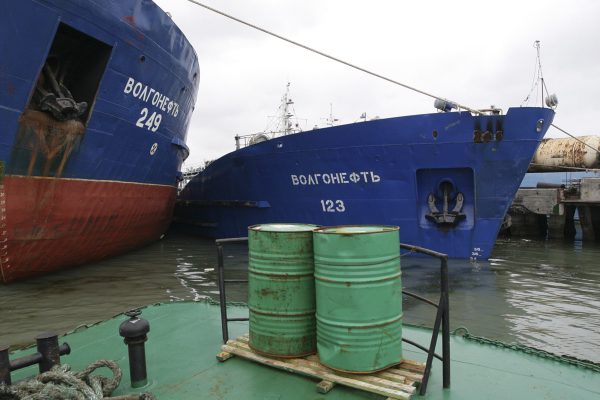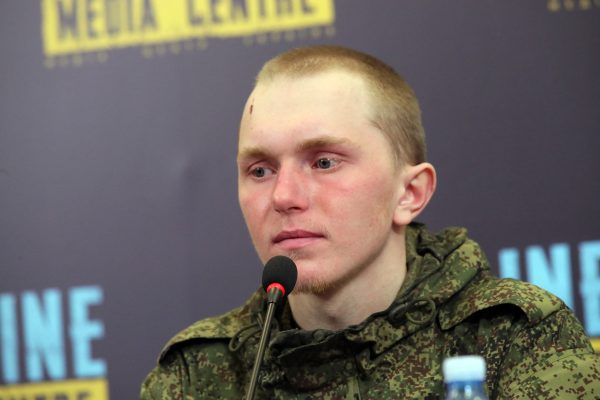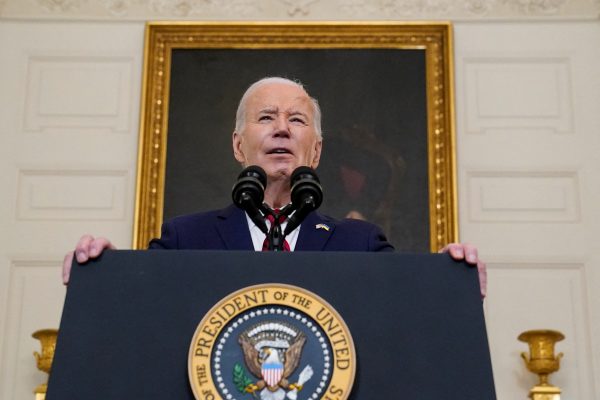The French President’s mention of a possible troop deployment to Ukraine statements following a February 26 meeting of major European countries on Ukraine aid, came as something of a shock to the allies.
They should not have been surprised. The issue was on the agenda beforehand and was discussed at the meeting itself. It’s more likely most of the allies were unaware that Macron was going to talk about it publicly.
In any case, while some of the French head of state’s past foreign policy formulations were improvised and misguided — from his” we must not humiliate Russia” (a sentence now revoked) to his immediately stillborn plan for a “coalition against Hamas” — this one had been meticulously calculated, planned and weighed up in terms of consequences and likely reactions. The shock effect was deliberate and calculated.
It was also sustained, both in comments made by the president in Prague and on March 7 when he met parliamentary leaders to lay out the rising risks of a Russian breakthrough toward Odesa and the possible need for the West to act. Since Putin knew no limits, he said, the West would hand him a significant advantage by imposing its own red lines.
Admittedly, the French President had been cautious in his language, presenting the dispatch of troops as an option and noting the allies’ lack of unanimity on the subject. But the very act of mentioning it dispelled yet another taboo.
At the same time, Macron spoke of all the previous obstacles that had been overcome, mentioning the (belated) dispatch of heavy tanks, long-range missiles, and fighter planes.
A much earlier delivery of longer-range missiles, air- and ground-based, particularly those capable of striking Russian territory in depth, might have aided a different outcome to Ukraine’s summer 2023 counter-offensive. It would also have helped save thousands of Ukrainian lives.
For over a year, in my pieces and TV talk shows, I have argued in favor of such a deployment, as it seemed likely firstly to curb the Russian offensive and increase the protection of Ukrainian civilians, and secondly to send a much more serious signal to the Kremlin.
Macron, who has long been seen as lackadaisical in his support for Ukraine — France’s military contribution falls short of some others, and far short of what we could do — understood that the message to be sent to Russia had to be urgently quantitative, given the dramatic shortage of ammunition and certain weapons among Ukrainian soldiers, but also qualitative. Something new was needed.
The president implicitly wished to point out a core reality, one that has been kept quiet by political leaders until now: faced with a total Russian war, destructive in its depth and horizontal in its scope (not only Ukraine, Georgia, Syria, Belarus, Africa, but also a war against democracies as a whole), an illusion had to die.
Such a war cannot be won by fighting from behind Ukraine, or by proxy. At some point, we have to get involved, and the sooner the better, because the passage of time reinforces the risk posed by a country that is massively rearming and has moved into a full war economy. On the evening of February 26, Macron declared for the first time that Russia must be defeated militarily, whereas previously he had only said that it must not win.
These remarks further hardened at the French president’s press conference in Prague on March 5, alongside his Czech counterpart, Peter Pavel, (the former head of NATO’s Military Committee and a decorated war hero who rescued French troops under fire in the Bosnian war.)
For the first time — in a generous borrowing from the title of my last book — Macron stated that this was “our war”, and not just that of the Ukrainians.
So now Macron seeks to dispel the difference between the French position and that of Ukraine. He accepts that Putin’s threat is aimed directly at all Europeans.
This recognition is now widely shared by European leaders, who are beginning to take the direct Russian threat seriously — remember that some weeks ago, German Defense Minister Boris Pistorius raised the possibility of war between Russia and Germany. Polish Foreign Minister Radoslaw Sikorski was even clearer at the United Nations, insisting that Russia will remain a threat until defeated for good. But the new Macron is also willing to draw the necessary conclusions.
He also castigated those who, lacking courage, risked failing to live up to history’s requirements, openly holding his colleagues to account. His Minister of Foreign Affairs, Stéphane Séjourné, in an interview with Le Monde, even spoke of the risk of reliving a 1938 moment.
If Macron seeks to make Europe think and understand the risks, he has his work cut out.
The group of allies with a clear position is small. Hungary and Slovakia are essentially pro-Russian, while a somewhat larger group of the three Baltic states, the Nordic states, the Czech Republic, Canada, and the UK, are solidly pro-Ukrainian.
As for the rest, there are three positions.
The first is German: the almost insulting vivacity of Olaf Scholz’s rejection of Macron’s mention of military force can be explained by his execrable relationship with the French leader.
Uncertain and edgy as leader of a party doing poorly in the polls, Scholz has slipped back toward the SPD’s old pacifist lines. This also helps to explain his irresponsible stubbornness in blocking the shipment of Taurus cruise missiles to Ukraine.
The second group includes most of the EU heads of state and government. Few have alerted their populations to the state of the war, its reality, and its risks. (Until recently, this has also been the case in France.)
These leaders feel that, on the eve of the European elections, when the risk of a rise in far-right support is significant in many countries, they cannot dramatize the situation. They don’t necessarily disagree with Macron’s declaration but they need to prepare public opinion. They can’t do it quickly, but that doesn’t mean they’re against it.
The third is American — and therefore Polish. As early as March 2022, President Biden declared that sending ground troops to Ukraine was out of the question, and would mark a monumental blunder since the signal of Western determination had already been received by Putin.
Above all, Washington is scared to death — which is why it is opposed to Ukraine’s integration into NATO — that an expanding conflict would suck the US into an enormous and unwanted war. Inevitably, it would be massively involved. And Poland, despite its profound understanding of the Russian threat, nonetheless considers itself both dependent on and protected by the United States. It will not risk this relationship.
Even so, positions are not set in stone, and it’s hard to see governments remaining in denial and isolation once others have decided to act. Those rejecting Macron’s words were the loudest, but remember that the mood music from the Baltic states, the Czech Republic, and the Netherlands were more positive. (It is also worth noting that the UK and France, among others, already have some military personnel in Ukraine.)
If Macron’s words do indeed provide a catalyst, the February 26 statement from the resident of the Élysée Palace will have been a game changer.
So, what might Macron consider in practice? Any mission would require sufficient ground troops — probably in the tens of thousands, given the extent of the frontline — to secure the already-liberated zones of Ukraine and protect them from strikes against civilian buildings, schools, hospitals and markets, as has been the case almost daily for the past two years.
This concept more or less corresponds to the idea that, since some people are not resolved to admit Ukraine into NATO immediately, they should at least accept NATO into Ukraine.
Russia could not sustain a conventional war with NATO, and these ground troops would deter it. Any country whose contingent was hit by a Russian strike could invoke Article 5 of the Washington Treaty. These forces would be able to aid Ukraine’s new F-16 fleet, as well as weapons system maintenance and base protection. They would make a difference, and they would be at risk, but they would not be frontline formations.
Most importantly, this change would end Western passivity and its belated, response-based policy. It would put uncertainty into the mind of Putin and his generals, and show our Ukrainian friends that when we say we’re determined to save their country from the invader, we mean it.
Nicolas Tenzer, a non-resident senior fellow at the Center for European Policy Analysis, is a quest professor at Sciences Po Paris and writes the international politics blog Tenzer Strategics. His latest book on Russia’s war against Ukraine, Notre Guerre. Le Crime et l’Oubli: pour une pensée stratégique (Our War. Crime and Oblivion. Reframing Strategic Thinking) was published on January 10, 2024 by Éditions de l’Observatoire. It is due to be translated into several languages.
Europe’s Edge is CEPA’s online journal covering critical topics on the foreign policy docket across Europe and North America. All opinions are those of the author and do not necessarily represent the position or views of the institutions they represent or the Center for European Policy Analysis.





